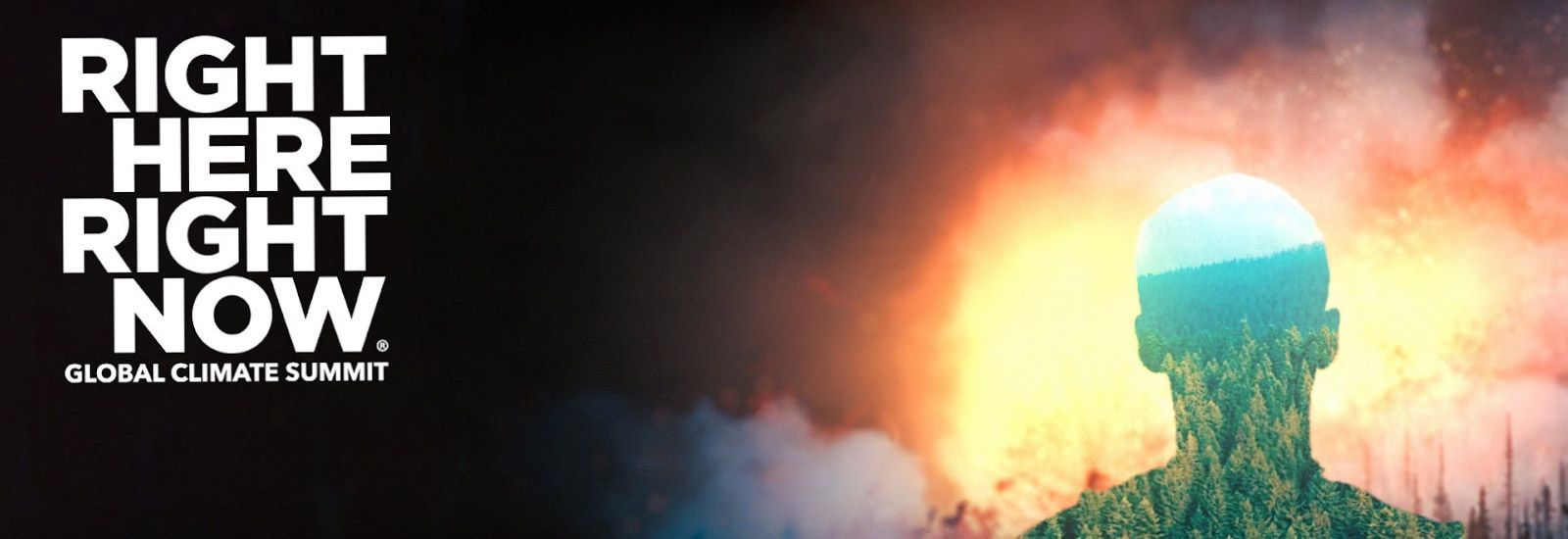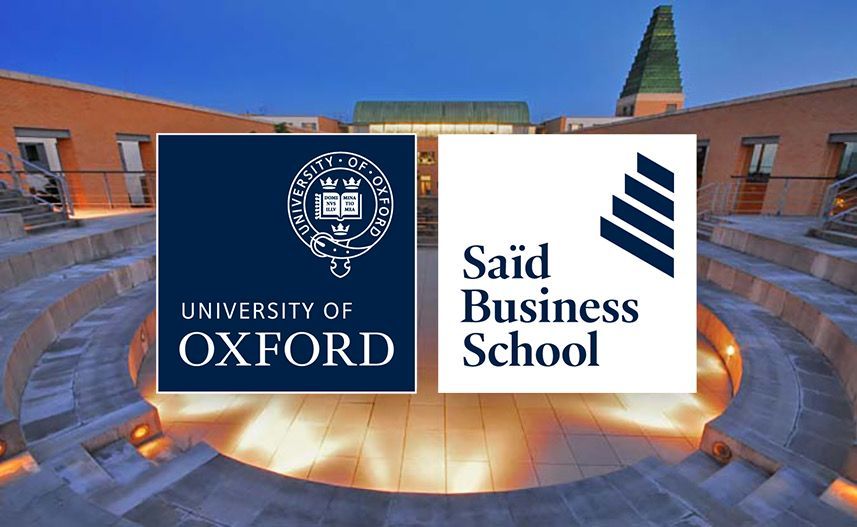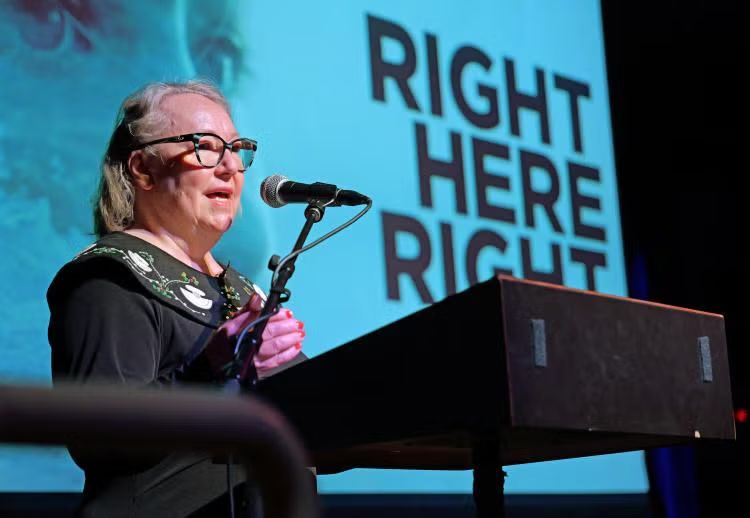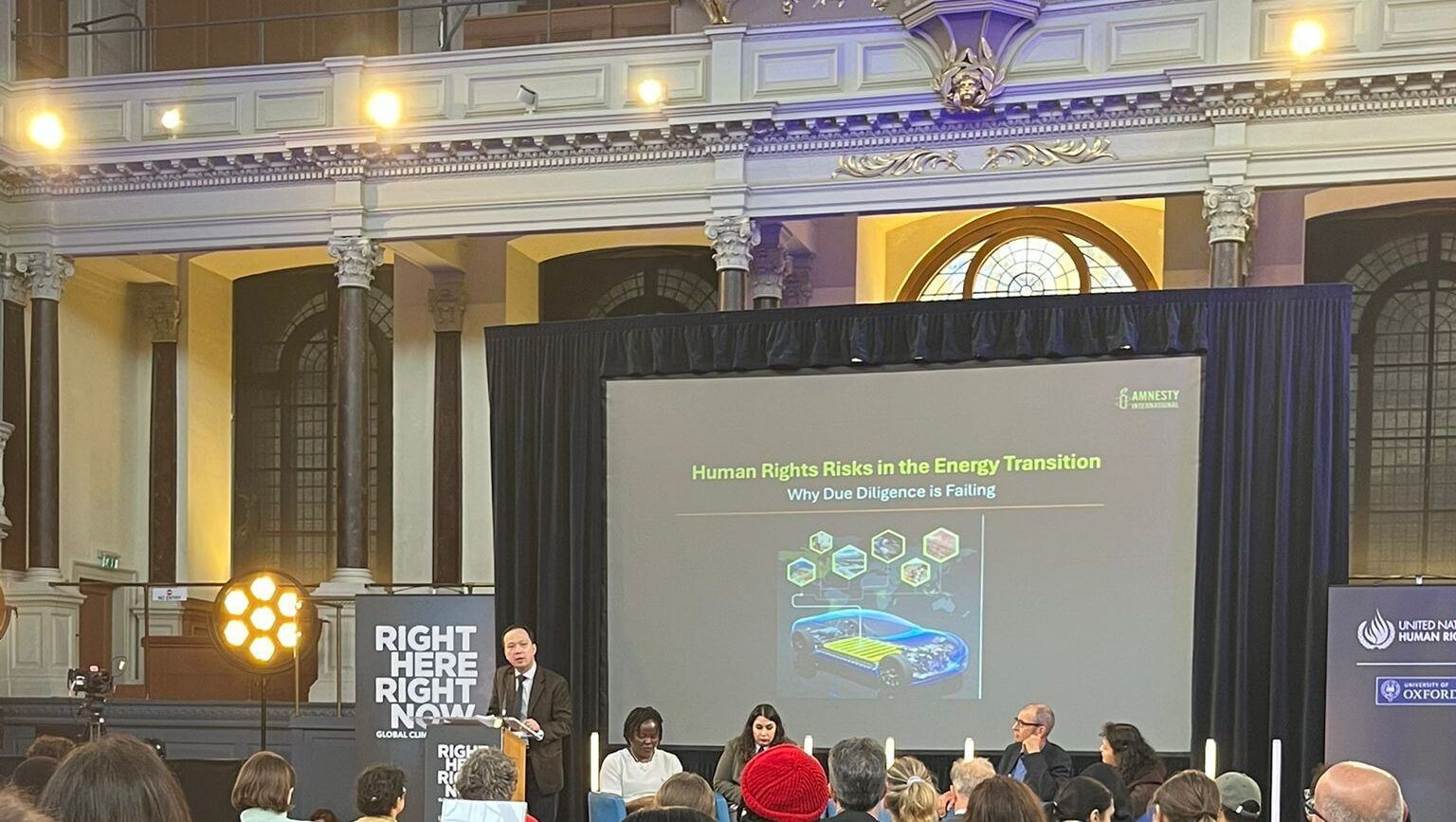Joint Statement from United Nations Human Rights, the University of Oxford, the International Universities Climate Alliance, and the Right Here, Right Now Global Climate Alliance

OXFORD, UK – When we first envisioned the 2025 Right Here, Right Now Global Climate Summit, we hoped to ignite a new kind of global conversation—one rooted not just in climate science, but in the language of dignity, equity, and justice.
Launched in the historic Sheldonian Theatre with opening remarks by Professor Irene Tracey, Vice-Chancellor of the University of Oxford, and Volker Türk, United Nations High Commissioner for Human Rights, the Global Summit began with a powerful broadcast of BBC’s Justin Rowlatt in conversation with leading voices from government, policy, economics, and youth movements.
Hosted by United Nations Human Rights and the University of Oxford, the Summit brought together leading government figures and universities from across six continents. Over one extraordinary week, it united global experts, Indigenous Peoples, environmental human rights defenders, academics, youth leaders, and artists to discuss human rights solutions to the climate crisis.
Speaking in support of the Summit, Volker Türk, UN High Commissioner for Human Rights, stated: “The law and science are aligned - human rights must be part of all solutions to address climate change and protect people.” He added, “The use of fossil fuels must be brought to a close,” and emphasized, “Together, we need to take a stand for climate action, climate rights, and climate justice.”
"I am profoundly grateful to our hosts UN Human Rights, the University of Oxford, and IUCA - for bringing together our extraordinary co-host universities around the world, and to all those whose vision and dedication made this landmark Summit possible,” said David Clark, Founder and CEO of the Right Here, Right Now Global Climate Alliance. “Together, we proved that global unity remains our most powerful force for advancing climate justice.”
Convened by the International Universities Climate Alliance
This global academic achievement would not have been possible without the leadership of the International Universities Climate Alliance (IUCA), whose coordination across regions and institutions enabled the seamless integration of research, events, and engagement. IUCA played a central role in aligning academic priorities, ensuring equitable participation, and making this unprecedented collaboration possible.
A 24-Hour Global Academic Plenary — and a Planetary Conversation
At the Summit’s core was a groundbreaking more than 24-hour Global Academic Plenary, a live broadcast that circled the globe—handing the climate justice conversation from Oceania, to South East Asia, to Africa, to Europe and then the Americas. Each partner crafted a regionally grounded session, rich with local expertise, urgent insight, and bold proposals for change. The hybrid event facilitated a global conversation without the need for mass air travel.
The Global Plenary is available to watch on demand here.
Here’s how co-host partners helped write a chapter of this global event:
The University of the South Pacific (USP)
Suva, Fiji
USP opened the global plenary with a powerful expression of youth leadership from Pacific Island nations on the frontlines of rising seas. Cultural performances and speeches on intergenerational rights set a moral compass for the entire Summit.
Monash University
Melbourne, Australia
Monash centered Indigenous-led climate adaptation and explored climate impacts through film, dialogue, and performance. The program spotlighted the intersection of environmental destruction and cultural survival—affirming cultural rights and the human right to health.
UNSW Sydney
Sydney, Australia
UNSW Sydney focused on just transitions, with an emphasis on highlighting voices from climate-vulnerable communities. The UNSW program brought together perspectives and practices from across the Southern Hemisphere and underscored the university's deepening commitment to: a sustainable society and planet; economic and social prosperity; and global collaboration, all pillars of the new UNSW Strategy: Progress for All.
University of Nairobi
Nairobi, Kenya
Nairobi delivered a robust and inclusive agenda focused on human rights, climate finance, adaptation, and regional justice. Featuring the African Development Bank and the Kenya National Commission on Human Rights, the session linked global systems to African solutions.
University of Cape Town
Cape Town, South Africa
UCT led a two-part session on embedding human rights into university teaching and research. With a strong focus on post-colonial injustice and decolonizing climate curricula, the university helped chart a path for the next generation of climate scholarship.
University of Oxford
Oxford, United Kingdom
The University of Oxford convened researchers, practitioners, and students for panels on the transformative power of law, unearthing injustice in the corporate supply chains of the green transition, and the intersection of human rights and climate change in conflict zones.
University of Colorado Boulder
Boulder, Colorado, USA
CU Boulder addressed water insecurity, pollution, and migration—culminating in a keynote by Inuit leader Sheila Watt-Cloutier. The discussion emphasized the importance of multilateral collaboration, youth engagement, and community involvement, with a focus on using data to track impacts, communicating more clearly to advocate for solutions, and reconnecting with nature to renew how we appreciate and protect our environment.
Universidade de São Paulo (USP)
São Paulo, Brazil
Bringing together a minister, the President of COP30, diplomats, the COP30 High-Level Champion, academics, frontline leaders, and youth activists, USP hosted a powerful pre-COP 30 dialogue linking climate justice and human rights. With a focus on the Amazon, Indigenous and traditional communities, and favelas, the event called for ethical climate finance, a just transition, and inclusive governance in Brazil.
The University of the West Indies
Kingston, Jamaica
The University of the West Indies coordinated a panel discussion with youth voices from different Caribbean islands (Jamaica, Antigua and Barbuda, St. Lucia, Barbados and Bermuda) who shared their perspectives on climate justice which included topics on postcolonial climate reparations, mental health, climate migration, climate finance and the need for equitable climate action. A short video was also included which provided an introductory visual context to the discussion. Support was aptly provided by the UN-OHCHR Caribbean Regional office.
Himalayan University Consortium (HUC)
Kathmandu, Nepal
The Himalayan University Consortium engaged community, science, and decision-makers in human rights-based climate action, through a four-way conversation between a community member, a scientist, a policy maker, and an Indigenous knowledge holder from countries in the Hindu Kush Himalayas on climate action.
KTH Royal Institute of Technology
Stockholm, Sweden
In a forward-looking dialogue, KTH challenged global leaders to reimagine the Sustainable Development Goals beyond 2030, integrating planetary boundaries and human dignity into a new framework for global ambition.
UN Human Rights & the International Universities Climate Alliance (IUCA)
Understanding climate ambition as a human-rights imperative, three expert panel conversations were facilitated by UN Human Rights and the International Universities Climate Alliance. The panels considered key topics at the intersection of climate change and human rights leading into COP30, including; Advancing gender equality in climate action; Human rights, climate finance and the road to 1.3 trillion; and Integrating human rights in NDCs 3.0.
UN Human Rights
In recognition of the critical role of journalism in advancing environmental and human rights agendas, UN Human Rights convened a regional panel of journalists from Malaysia, Indonesia, the Philippines, and the Mekong region. The discussion explored the intersection of climate reporting, press freedom, access to information and community engagement in Southeast Asia.The panel highlighted the importance of cross-border collaboration, multi-stakeholder engagement, and investing in local journalist networks to ensure climate journalism can thrive as a tool for accountability and justice in the region
Oxford: 38 Events Anchor the Summit in Local Community
As host, the University of Oxford staged 38 distinct Right Here, Right Now events, turning the event into a week-long climate-justice laboratory. Highlights included:
- Photography 4 Humanity: A Lens on Climate Justice, a photo exhibition curated and presented by Fotografiska
- Volker Türk’s Linacre Tanner Lecture, which set the ethical tone of the week
- A high-profile event at the Sheldonian launched by Irene Tracey, Volker Türk, which featured Justin Rowlatt from the BBC interviewing Kate Raworth, Vanessa Nakate, and Lord Alok Sharma, among others.
- Call for Code Climate Challenge showcased tech for climate action with Founding Partner IBM and Global Impact Partner UN Human Rights
- The Bonavero Climate and Law Conference, laying the foundation for legal accountability
- Global Youth Climate Summit presented by Oxford's Saïd Business School to ensure that young voices lead
UNSW Sydney: Climate Warriors
Presented by the UNSW Centre for Ideas and UNSW Engineering, in association with the Right Here, Right Now Global Climate Summit. Climate Warriors brought together four transformative voices; renewable energy expert and former Biden administration advisor Saul Griffith, Solar Citizen CEO Heidi Lee Douglas, climate activist Grace Vegesana along with host and journalist Craig Reucassel, who unpacked the power and limitations of grassroots action, climate innovation and community-driven change.
Artists and Icons Lent Their Voices
Cultural influence played a pivotal role in amplifying the message of the Right Here, Right Now Global Climate Summit. A chorus of global stars - icons of music, film, and activism lent their names and social voices to support the Summit’s urgent call for climate justice.
Among them were Barbra Streisand, Jeff Bridges, Annie Lennox, Jeremy Irons, Dave Matthews, Chelsea Handler, Billie Jean King, Neil Young, Carole King, Cyndi Lauper, Pierce Brosnan, Katherine Langford, Margaret Cho, Jason Mraz, Rachel Platten, and Laura Pausini - each bringing their influence to promote climate justice.
In addition, multi-platinum recording artist Ellie Goulding delivered a powerful live performance during a special Right Here, Right Now Climate Concert—seamlessly uniting music and message.
A Defining Moment in Global Higher Education - and Climate Justice
This Summit marked an extraordinary convergence between United Nation Human Rights and leading universities around the world - uniting in a singular, urgent voice to center human rights within the global response to climate change. It demonstrated the immense power of academia when policy, law, science, the arts, and youth come together - in the collective pursuit of climate justice.
From here, the Right Here, Right Now Global Climate Alliance, United Nations Human Rights, the University of Oxford and the International Universities Climate Alliance will build on this momentum - expanding partnerships, seeking to develop global curricula, and advance the next wave of human rights-centered climate solutions. Right Here. Right Now.
Share this post:
Additional Recent News








